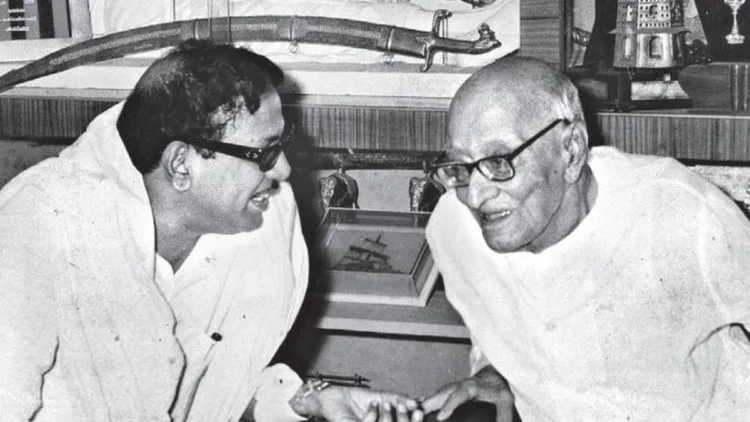In the midst of alarming hooch tragedies claiming hundreds of lives in Tamil Nadu today, it’s intriguing to revisit a period when the state, alongside Gujarat, stood out as one of the only two in India to enforce a total prohibition of alcohol. The current trends are deeply concerning, yet they prompt a reflection on past solutions and strategies that could guide future reforms. Let’s embark on a journey through the fascinating history of Tamil Nadu’s approach to alcohol regulation and prohibition.
In 1971, Tamil Nadu stood alongside Gujarat as one of the two states in India to enforce a total prohibition on alcohol. This remarkable stance was not just a legislative decision but a bold experiment in social reform and governance. To understand this journey, we delve into the historical landscape where political giants shaped the state’s alcohol policies.
Rajaji’s Prohibition Era
The saga began in 1937, when Rajaji, a prominent leader of the Indian National Congress, assumed office as the Prime Minister of Madras Presidency. Armed with a vision to combat alcoholism, Rajaji initiated prohibition in stages, starting from his home district of Salem. Liquor shops shuttered, advertisements banned, and stringent measures imposed marked the early days of this ambitious social project. Despite concerns over revenue loss, Rajaji staunchly defended his actions, famously stating, “The rich must be taxed if the poor are to be saved.”
In a diplomatic move to avoid friction with the British colonial administration, Rajaji exempted European officers from prohibition, granting them permits to consume alcohol. Ironically, the British officials in Salem, including the district collector and police superintendent, chose to abstain voluntarily, underscoring the moral weight of Rajaji’s campaign.
Special concessions were granted to churches for sacramental wine and hospitals for medicinal purposes. Stringent policing against bootlegging became the norm, with alcohol addicts within the police force reassigned out of affected districts. Governor Lord Erskine praised the success of prohibition, drawing attention from even the British monarchy for its effective implementation.
Congress Continues Prohibition
Post-independence, Tamil Nadu continued its prohibition policy under Congress rule, setting it apart from neighbouring states like Andhra Pradesh and Mysore. However, the tide turned in 1971 when M. Karunanidhi assumed office as Chief Minister following C.N. Annadurai’s death. Despite opposition, Karunanidhi lifted the prohibition citing economic reasons, arguing that the state deserved compensation for lost revenue from the central government and coalition partners.
The End of an Era
Fast forward to 1971, when M. Karunanidhi assumed the Chief Minister’s office after the demise of C.N. Annadurai. Despite strong objections, especially from the legacy of Rajaji, Karunanidhi advocated for lifting the prohibition on economic grounds. He argued that the central government, under Indira Gandhi’s leadership, had failed to compensate states with existing prohibition policies for their revenue losses.
On a fateful evening in July 1971, Rajaji personally visited Karunanidhi to plead against the repeal of prohibition, warning of its detrimental effects on future generations. However, Karunanidhi remained resolute, and in the face of mounting opposition, the DMK government lifted the prohibition that had stood for over 25 years.
The Aftermath
With the stroke of a legislative pen, Tamil Nadu transformed from a bastion of sobriety to a state with flourishing alcohol and toddy markets. Chennai alone boasted 56 toddy shops and 52 liquor outlets, while districts like Thanjavur saw a proliferation of 1304 toddy shops. The state’s revenue surged, with annual earnings reaching 26 crores from alcohol sales alone. Yet, this economic gain came at a profound social and cultural cost, reflecting a stark departure from the ideals that once shaped the state’s moral landscape.
Reflections on Today
As we reflect on Tamil Nadu’s journey from prohibition to permissiveness, questions linger about the societal implications and the legacy of leaders like Rajaji and Karunanidhi. The shift underscores a broader narrative of evolving governance and economic priorities in post-independence India, where policies on alcohol continue to be debated in the context of public health, revenue generation, and social order.
Today, as Tamil Nadu grapples with the fallout of unrestricted alcohol consumption, the tale of its journey from prohibition to liberation serves as a poignant reminder of the delicate balance between public policy, economic imperatives, and social responsibility. The legacy of leaders like Rajaji, who upheld moral principles despite challenges, contrasts sharply with subsequent decisions that reshaped the state’s relationship with alcohol.
In the words of Thiruvalluvar, the revered Tamil poet and philosopher, the state’s current trajectory may evoke a sense of unease about the moral fabric and societal values that define Tamil Nadu today.


















Comments